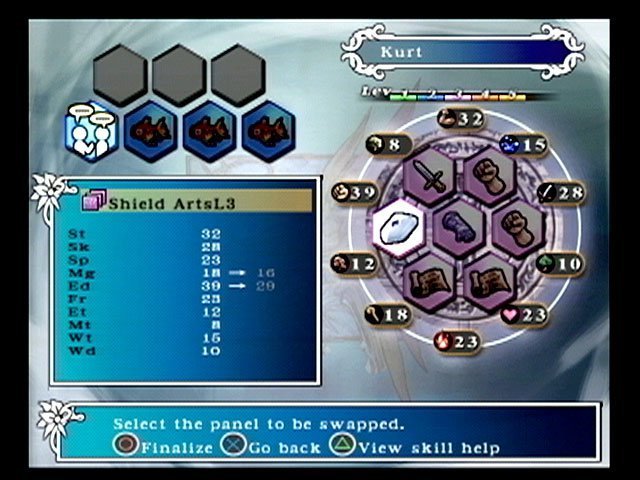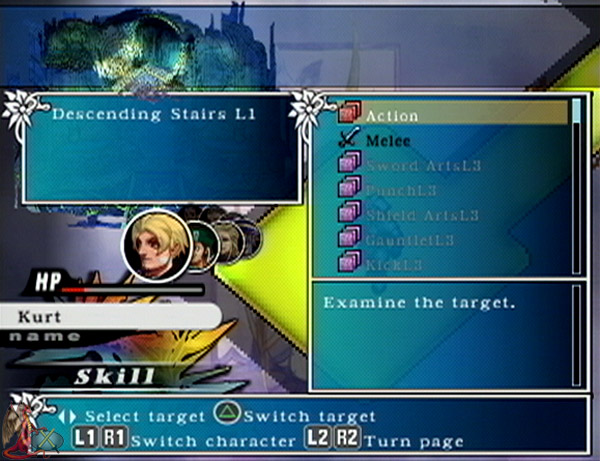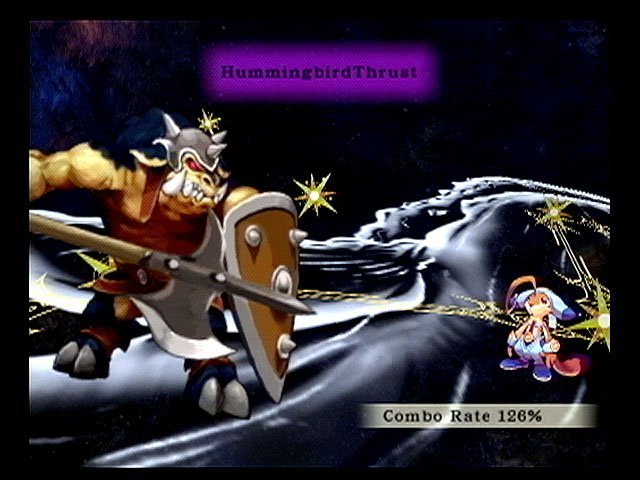 |
Unlimited Saga - Review |
 |
An End to Alt-Caps
By: Jake Alley
| Review Breakdown |
| Battle System |
6 |
| Interface |
5 |
| Music/Sound |
7 |
| Originality |
8 |
| Plot |
3 |
| Localization |
3 |
| Replay Value |
9 |
| Visuals |
5 |
| Difficulty |
Hard |
| Time to Complete |
10-20 hours per character
|
|
| Overall |
 |
| Criteria
|
Square's SaGa series can be considered in many ways the evil twin of Final
Fantasy. The more emphasis FF places on computer rendered 3D movies, the more SaGa explores simple
hand painted stills. The more FF simplifies, the more complex the Saga series gets. The more linear,
the more freedom. And perhaps most importantly, the easier and more accessible the Final Fantasy
series grows, the more SaGa taps the masochist's market. The latest entry in the series, Unlimited Saga,
is no exception.
Unlimited Saga brings with it a variety of original and complex new concepts. The
greatest flaw of the game is the fact that no explanation is given for the bulk of these concepts
within the game or even, in many cases, in the instructions. This sink or swim approach can easily
put players off from the start, particularly considering how vital it is to learn how to improve your
characters in the face of the rather high difficulty.
If one is able to get a grip on the basics however, Unlimited Saga is a
fairly interesting game, with a far stronger resemblance to paper RPGs than the average console
game does. From town, one can head to the local inn and gather information, outfit one's party,
and choose one of several self-contained adventures to embark on. Some of these advance the plot,
others just present a chance to improve one's characters.

|
| More complex than it looks.
|
|
Improving characters, again in the spirit of paper RPGs, is restricted to the
ends of these adventures. Upon successful completion of an adventure, each character gets a choice of four new skills to plug
into a grid of seven slots, and a higher max HP if they fought. The variety and positioning of
skills on a character's grid determines the growth of their stats, and the skills themselves have
important effects both in and out of combat.
The adventures themselves are presented in a rather strange fashion. A sort of
board game piece representing your party is moved about a simple map which grows as you explore
it, with every monster running around individually as well. Fights occur when one of these monsters
chooses to attack you (or vice versa), forcing you to battle every monster occupying the same location.
Frequently however, the challenge of dealing with these monsters pales in comparison to the other
challenges often involved in adventures, ranging from disarming traps and picking locks to solving
puzzles and racing against a clock.

|
| Exploring a dungeon. |
|
Although it receives much less focus than in the average game, combat in Unlimited
Saga offers a very welcome visual change of pace. Rather than the stark and spartan exploration
graphics, battles present RPGamers with highly detailed 3D backgrounds textured with watercolor
paintings, and highly detailed character sprites. Combat also features a starkly different handling
of damage than the average game. Reducing the HP of both monsters and characters alike has less
impact than one would think, as even having 0 HP fails to take them out of action. Instead HP simply
serves as a buffer against the critical injuries one must rack up to be killed. Thus the damage
dealt over time is far less significant than well-timed combination attacks delivering a strong
blow all at once. Later in the game in fact, bosses have such high defense that such attacks are
the only way of injuring them at all.
Moving away from the meat of the gameplay, Unlimited Saga features an excellent
symphonic soundtrack and a choice of seven main characters, each with their own storyline. None
of these storylines have the degree of focus one finds in the average RPG, but each has a fair
amount of meat on the bone, unlike the earlier SaGa Frontier.

|
| Combat is less spartan. |
|
Of course, while the music is quite good, Unlimited Saga is not as easy on the
ears as it could be. Aside from the lack of a much needed tutorial, the biggest problem facing
the game is the hit or miss voice acting found sporadically during plot points and combat. Largely
due to the fact that the misses outnumber the hits by a fairly large margin. Out of the huge cast
of major and supporting characters, only a handful have voices which don't grate on the nerves,
in stark contrast to the excellent voice work heard in most recent games.
All in all, Unlimited Saga does a very good job of what it sets out to, but what it sets out to
do is decidedly not for everyone. The typical RPGamer should avoid the whole series like the plague,
but if you're looking for a challenge and you have a bit of a masochistic streak, Unlimited Saga
will keep you busy for quite some time.
|










